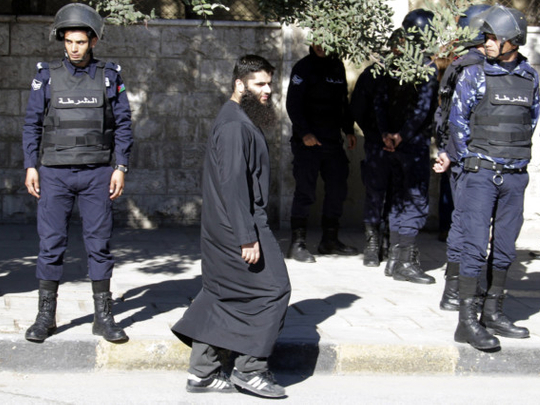
Amman: Radical Islamist cleric Abu Qatada on Tuesday insisted he was not guilty of terrorism as his trial resumed in Jordan, accusing a presiding judge of being “dishonest”.
“I am not guilty, and you are a dishonest judge,” Abu Qatada, who was deported by Britain in July after a nearly decade-long legal battle, told judge Ahmad Qatarneh.
The Palestinian-born preacher was condemned to death in absentia in 1999 for conspiracy to carry out terror attacks, including on the American school in Amman, but the sentence was immediately commuted to life imprisonment with hard labour.
In 2000, he was sentenced in absentia to 15 years for plotting to attack tourists in Jordan during millennium celebrations, and videotapes of his sermons were allegedly found in the Hamburg flat of 9/11 ringleader Mohammad Atta.
Qatarneh led a panel of civilian judges after Abu Qatada and his lawyer contested the presence of a military judge at the start of his trial on December 10, saying it was against a Jordanian-British deal which cleared the way for him to be tried in the kingdom.
On Tuesday Abu Qatada shook and kissed the hands of his four sisters after the court allowed them, along with his three brothers and son, to attend the trial.
Wearing brown overalls, he stood uncuffed before the judge, smiling and appearing calm and confident in the beginning, but later growing visibly agitated.
“You shut up and sit down,” Abu Qatada told a military prosecutor after he demanded the suspect “respect the court”.
The judge adjourned the trial until January 16 after a two-hour hearing which was open to the media but with cameras banned.
On December 10, Abu Qatada pleaded not guilty, telling the court: “You know full well I am not guilty and that this accusation is false.”
After his deportation, Abu Qatada was granted a retrial in line with Jordanian law, and military prosecutors charged him with conspiracy to carry out terrorist acts. If convicted he could face a minimum of 15 years’ hard labour.
Britain’s expulsion of Abu Qatada came after Amman and London ratified a treaty guaranteeing that evidence obtained by torture would not be used in his retrial and that the proceedings would be transparent.
Born Omar Mahmoud Mohammad Othman in Bethlehem in the now Israeli-occupied West Bank, Abu Qatada has Jordanian nationality because the town was part of Jordan at the time of his birth.
Top Spanish judge Baltasar Garzon once described Abu Qatada as Osama bin Laden’s right-hand man in Europe, although he denies ever having met the late Al Qaida leader.












